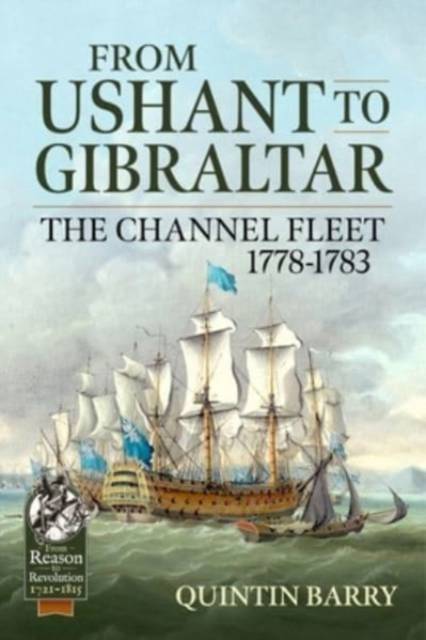
- Retrait gratuit dans votre magasin Club
- 7.000.000 titres dans notre catalogue
- Payer en toute sécurité
- Toujours un magasin près de chez vous
- Retrait gratuit dans votre magasin Club
- 7.000.0000 titres dans notre catalogue
- Payer en toute sécurité
- Toujours un magasin près de chez vous
Description
In 1778, when the expected war finally broke with France, Lord Sandwich, the long serving First Lord of the Admiralty, had to find the resources to match the French fleet not only in the Channel but in other theaters of war such as the West Indies, the Mediterranean and the Indian Ocean. In addition, the Royal Navy had to protect Britain's extensive maritime commerce, covering the large inbound and outbound convoys on which the country's economy depended. This book is a study of the men who led and the men who managed, both afloat and ashore, the Channel Fleet.
In 1778 it was commanded by Admiral Augustus Keppel; third in command was a member of the Board of Admiralty, Vice Admiral Hugh Palliser. On 27 July it engaged the French fleet commanded by d'Orvilliers. The battle was inconclusive, both sides claiming the victory. During the battle Palliser's flagship suffered particularly. At the time, no issue arose between Keppel and Palliser as to the course of the battle, but when, in late October, the latter came ashore he was shown a newspaper that suggested that he was to blame for Keppel's failure to continue the battle. He was furious, but Keppel refused to sign a statement clearing Palliser's name. The dispute escalated; Palliser demanded Keppel's court martial but he was acquitted, as was Palliser himself when he in his turn was court-martialled. The navy's officer corps was profoundly divided, and it caused lasting damage.
After Sandwich, the most important naval administrator was the outspoken Sir Charles Middleton, the Comptroller of the Navy. He was responsible for two key innovations - the coppering of ships hull's which protected them against damaging marine growths and significantly increased their speed, and the introduction of the cannonade, a lighter cannon of shorter range but greater hitting power. Middleton enjoyed a close relationship with Richard Kempenfelt who was arguably the ablest sea officer on either side. With Lord Howe, Kempenfelt was responsible for the introduction of a new system of signaling. He won a striking victory when attacking a heavily defended French convoy in 1781 but tragically died in 1782 when his flagship the Royal George sank at her moorings at Spithead. Throughout the war the French and Spanish planned the invasion of southern England. The enormous Combined Fleet appeared first in the Channel in 1779, but although causing a panic when it arrived off Plymouth, it was suffering from an epidemic of smallpox and abandoned the attempt.
In 1782, with the fall of Lord North's ministry, Sandwich left the Admiralty. Vilified by nineteenth century writers, his reputation has been largely restored by more recent historians.
In 1778 it was commanded by Admiral Augustus Keppel; third in command was a member of the Board of Admiralty, Vice Admiral Hugh Palliser. On 27 July it engaged the French fleet commanded by d'Orvilliers. The battle was inconclusive, both sides claiming the victory. During the battle Palliser's flagship suffered particularly. At the time, no issue arose between Keppel and Palliser as to the course of the battle, but when, in late October, the latter came ashore he was shown a newspaper that suggested that he was to blame for Keppel's failure to continue the battle. He was furious, but Keppel refused to sign a statement clearing Palliser's name. The dispute escalated; Palliser demanded Keppel's court martial but he was acquitted, as was Palliser himself when he in his turn was court-martialled. The navy's officer corps was profoundly divided, and it caused lasting damage.
After Sandwich, the most important naval administrator was the outspoken Sir Charles Middleton, the Comptroller of the Navy. He was responsible for two key innovations - the coppering of ships hull's which protected them against damaging marine growths and significantly increased their speed, and the introduction of the cannonade, a lighter cannon of shorter range but greater hitting power. Middleton enjoyed a close relationship with Richard Kempenfelt who was arguably the ablest sea officer on either side. With Lord Howe, Kempenfelt was responsible for the introduction of a new system of signaling. He won a striking victory when attacking a heavily defended French convoy in 1781 but tragically died in 1782 when his flagship the Royal George sank at her moorings at Spithead. Throughout the war the French and Spanish planned the invasion of southern England. The enormous Combined Fleet appeared first in the Channel in 1779, but although causing a panic when it arrived off Plymouth, it was suffering from an epidemic of smallpox and abandoned the attempt.
In 1782, with the fall of Lord North's ministry, Sandwich left the Admiralty. Vilified by nineteenth century writers, his reputation has been largely restored by more recent historians.
Spécifications
Parties prenantes
- Auteur(s) :
- Editeur:
Contenu
- Nombre de pages :
- 364
- Langue:
- Anglais
- Collection :
Caractéristiques
- EAN:
- 9781915070395
- Date de parution :
- 21-06-22
- Format:
- Livre broché
- Format numérique:
- Trade paperback (VS)
- Dimensions :
- 155 mm x 249 mm
- Poids :
- 798 g

Les avis
Nous publions uniquement les avis qui respectent les conditions requises. Consultez nos conditions pour les avis.






